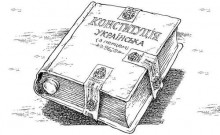Protest events and general crisis conditions in Ukraine have forced politicians and experts to talk again about the constitutional changes. They see return to the Constitution of 2004 as a way out of this predicament. For some it is a legal necessity, some again treat it as a matter of political expediency. Unfortunately, the latter dominates the political life of Ukraine. Although the Constitution of 1996 was recognized as one of the most democratic both by Ukrainians themselves and in Western Europe, it was written to benefit certain persons.
Orange events of 2004 forced politicians to sit down at the negotiating table and seek a compromise. They found it by allowing Yushchenko to become president after all, but forcing him to agree to changes to the constitution, which over time turned him into a powerless figurehead to some extent. The country then plunged into a political chaos that lasted several years. It looks unlikely that the authors of this “constitutional combination” had the best interests of the country in mind.
In 2010, the Constitutional Court revived the Constitution of 1996. The current president needed more powers, and he got them back (if not for the events of 2004, he would have them back then already). For what did he need them, is another matter. If he wanted to pursue modernization and changes in the country, as the authorities declare, then where are these? On the other hand, the current president has established the Constitutional Assembly presided over by Leonid Kravchuk. It has already developed a draft of amendments to the Constitution. The first president has said they are now awaiting approval at a meeting of the assembly and will then be submitted to President Yanukovych for consideration.
What will come out of this, we will hopefully learn soon. We can be sure already that writing of the constitution to benefit some persons is no way to ensure its effective implementation. Another issue is the real crux of the matter. One can rewrite and revive the constitution to no end – and to no avail, as long as everybody has not learned to live by the rules. Never mind what kind of state it will be, a presidential-parliamentary or parliamentary-presidential republic. In the first case, the abuse of powers to further private rather than public purposes is a constant danger, while the second one always degenerates into political confrontation if state mechanisms and institutions are weak.
As you can see, the theoretical and practical problems are really hard to solve. Below, you can find expert opinions on the subject expressed in a kind of 3D format, with legal and historical opinions supplemented by lessons taken from foreign experience.







